On the Tragically Hip’s last stop: ‘This is carpe diem’
Michael Barclay on the rock’n’roll spectacle of the Man Machine Poem tour
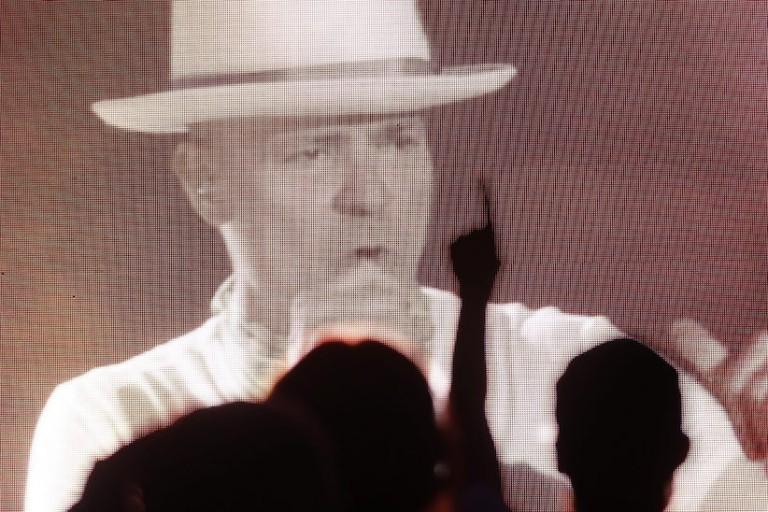
Tragically Hip fans gather in Winnipeg’s Assiniboine Park to view the last Hip concert from Kingston on video screen Saturday, August 20, 2016. THE CANADIAN PRESS/John Woods
Share
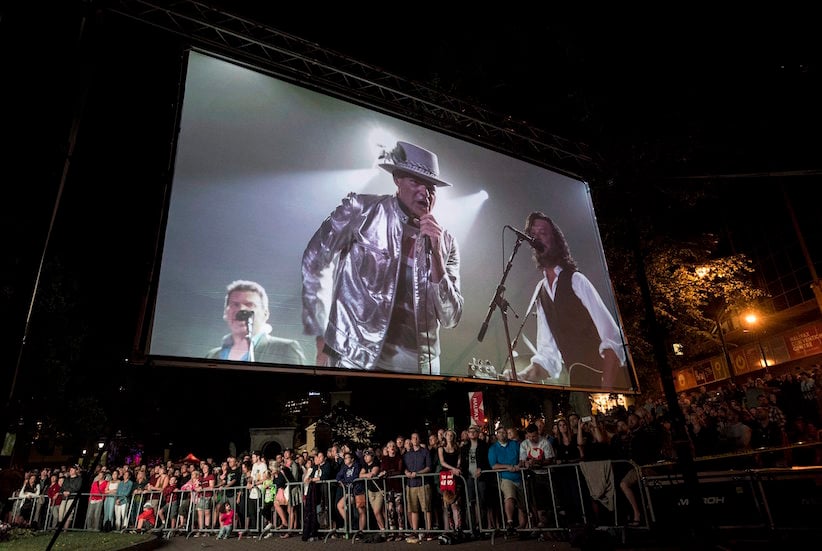
Away from the hullabaloo outside Kingston city hall, where tens of thousands have come from all over the continent—yes, including many from the U.S., from Texas and Maine and Kentucky and Philly—the scene inside the K-Rock Centre at One Tragically Hip Way in the band’s hometown is electric. People are in their seats and standing and cheering a good 20 minutes before the band goes on stage. There is an inevitable and spontaneous round of “O Canada.” There is an enormous Canadian flag signed by people in the merch line outside the arena, with well wishes for Gord Downie, that makes several trips around the stands. There is a large banner that read, “Thank you Prime Minister Downie.” The PA system plays Jimmy Cliff’s “The Harder They Come, the Harder They Fall.”
Hours earlier, when I first arrive in town, I meet Tony Ingram of Cornwall, Ont., in a municipal parking lot (event parking fee: $3.15). He first saw the band a mere year into their existence, back in 1985. “They were playing at a stock-car track outside of Ottawa. There were eight bands playing that day. Nobody had ever heard of these guys. They went on at midnight. My wife and I thought, wow, what a great band. When they got on the radio years later we remembered that they were the band we saw.”
Down in Market Square, a crowd of what will eventually reach 25,000 people is assembling. A couple with lawn chairs is perched between two storefronts. Moe Peters has lived in Kingston all his 82 years; his wife, Dee, has only a mere 66 years in town. They arrived at 10 a.m. to scope out the city’s big day. “Most people, even if they’re our age, are very excited,” says Dee. The Tragically Hip means more to their children than to the elderly couple, but they live down the street from bassist Gord Sinclair’s parents and met him at a wedding once. Gord Downie’s type of brain cancer is exactly what Dee’s sister died of 12 years ago. “Her doctor was on the big screen over there earlier explaining that since then they do have more hope [for these patients]; they can extend life, to a point. It would mean a lot to her for us to be here.” Have they ever seen an event like this in Kingston before? “We came down because we’ll never see anything like this in our town again. We had the blues festival with what’s-his-face, [Dan] Aykroyd. That was kinda neat, but not crowds like this.”
A man who identifies only as “Steve from Toronto” is outside the venue looking for tickets. He saw the third Toronto gig and says, “It was everything I wanted in a concert. The band is going out on a high note.” He is prepared to pay “$700 at the most” for a ticket. “Can’t do more than that. I saw a guy selling for $1,500 each.”
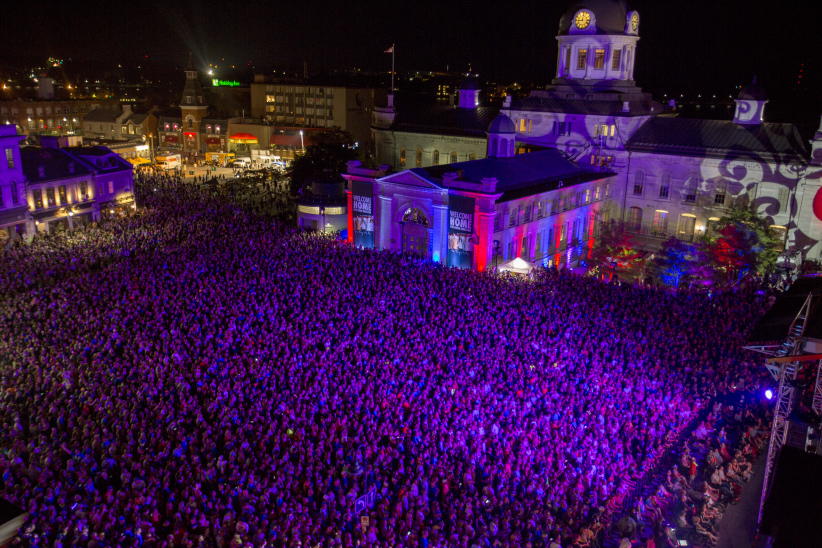
Inside the venue, after I have to prompt the woman at the will-call to ask me for ID, I’m seated next to Keeley Renwick, a native of Kingston now living in Toronto. I ask him if he knew the band way back when. “Oh yeah, went to the same high school.” Kingston Collegiate? “Yeah, they were a bit older than me though. One of their fathers taught me.” So when was the first time you saw the Tragically Hip? “No, at KCVI.” Wait, you mean when they were still the Rodents, the punk band playing in the cafeteria? “Yep, they were exciting.” What songs were they covering back then? “No idea, but they were great even then.” How many times have you seen them? “Eight. But this trumps everything. This is Kingston bowing down to the Hip, and saying thank you.” He pauses, sips his beer. “It’s mind-blowing they haven’t made it in the U.S.” Is that important to you? “No. It’s just too bad for the U.S. This band is 10 times better than Nickelback.”
At 8:30 p.m. sharp, our hosts arrive. As has been true on every stop on the Man Machine Poem tour, this is not a funeral, nor a wake. This is a rock’n’roll spectacle, not a rock’n’roll suicide. This is carpe diem. This is about: “Get it out, get it all out / Yea stretch that thing / Make it last, make it all last / At least until the supper bell rings.”
First up: the Fully Completely album. “Fifty-Mission Cap,” “Courage,” “Wheat Kings,” “At the Hundredth Meridian.” Those middle two songs have been occasion for joyous weeping at other stops; here it’s just pure joy.
The one and only signs of the night where things seem somewhat amiss is in “Hundredth Meridian,” when, during the bridge, Downie stumbles and, ironically, misses the key line: “It would seem to me I remember every single f–kin’ thing I know.” No matter: he nails the next part, the half-rapped verse about “if I die in vanity,” in which he gets Ry Cooder to sing his eulogy, in which there as “whispers of disease and acts of enormity”—which pretty much sums up the night, primarily the latter.
Next: four songs from the new Man Machine Poem, which, to these ears, is one of the greatest things the band has ever done, albeit a left turn. Next to me, Renwick decides to go get another beer, because no beer will be sold after 9.45 p.m. Meanwhile the band plays the single “In a World Possessed by the Human Mind,” a song I missed at the Air Canada Centre show in Toronto because I spent 80 minutes there in a will-call line—80 minutes that included the first 30 minutes of the show.
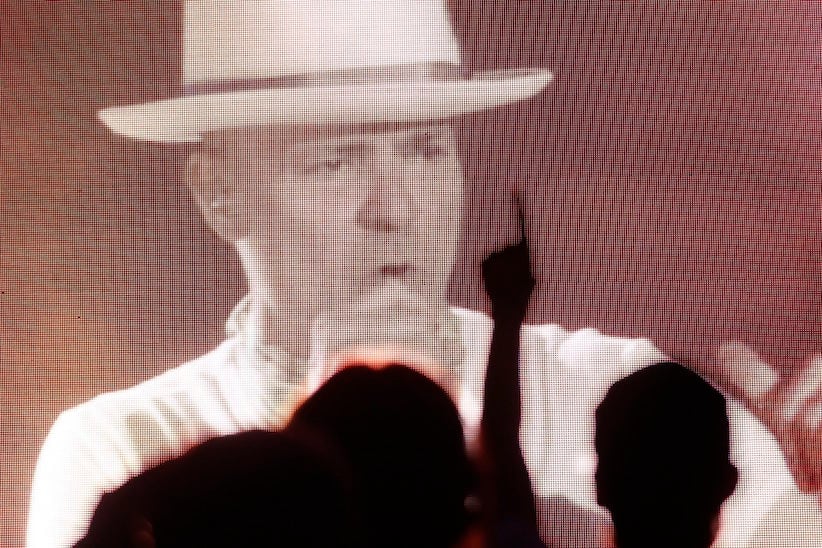
Onwards, more new songs: “What Blue” and “Tired as F–k,” the latter with the line, “I want to stop so much I don’t want to stop.” Gordie, baby, we know exactly what you mean. But the man is a machine. Hence: “Machine,” the first verse of which he sings an octave lower than the recording; never in my life did I expect Gord Downie to try and sing like Stephin Merritt. Weird lit-nerd trivia: it’s also one of two songs on the album with lyrics referencing Northrop Frye.
In between those two songs, Downie gives an incredibly uncharacteristic political endorsement of our sitting Prime Minister, specifically crediting his work on First Nations issues. That is—well, pretty weird. The Tragically Hip have supported many political causes in the past, but being the everyman band they are they’ve never been known to flat out endorse a leader. Now they don’t need to worry about alienating any faction of the record- and ticket-buying public on what is most likely the last night of their career, so: why not?
Every set list on this tour has featured a wild card. That means while you will always hear songs from Fully Completely, Day For Night, Trouble at the Henhouse, Phantom Power and the new one—and one of either Up to Here or Road Apples—you also got something from the 2000s, an era when the band entered a slow commercial decline, a.k.a. the songs most fans probably aren’t that excited about hearing. Tonight it is 2000’s Music @ Work, which means the rousing title track (“The night’s so long it hurts”), “Lake Fever” (“’Til we’re talking in whispers again”), “Toronto #4” (“You were far more unifying than you know”) and “Putting Down” (“There’s reasons for the road, I guess / to document the indigenous”).
Then we’re back to the classics, this time from 1991’s Road Apples. “Twist My Arm,” perhaps the one and only time the Tragically Hip ever sounded anything like the Red Hot Chili Peppers. “Three Pistols,” featuring a line that made me want to write a book about the incredibly fertile creative period that spawned this band and many of their peers: “Bring on a brand new renaissance / because I think I’m ready / I’ve been shaking all night long / but my hands are steady.” The acoustic ballad “Fiddler’s Green,” written more than 25 years ago about a five-year-old nephew of Downie’s who died of a heart condition, only became recurrent in Hip sets 10 years ago; for too long it was too painful to play. Here, playing it in their hometown, it is the first time visible emotion crossed Downie’s face.
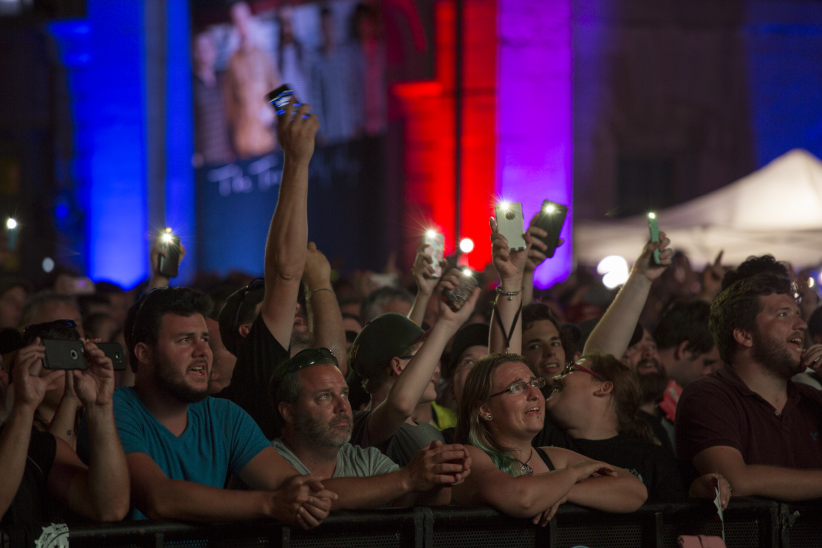
But wipe away those tears, here comes “Little Bones.” The crowd goes apes–t in ways I’ve only ever seen when Bruce Springsteen breaks into “Born to Run.” Bonus track: the band has not been playing more than four songs from any given album on this tour, but tonight we get, appropriately, “Last of the Unplucked Gems,” a trippy slow burn for most of which Downie leaves the stage.
In a town that still vividly remembers the January 1998 ice storm, they cheer for “Something On,” from Phantom Power (“Outside there’s hectic action / the ice is covering the trees”). Then “Poets,” now one of the most beloved rockers in the catalogue—though I remember seeing it performed on that 1998 tour, when it was greeted with mere indifference, a new song to be tolerated while waiting for the “classics.” Now it’s hands-down a highlight of the set. As is, of course, “Bobcaygeon” (in which the audience sang the bridge, after Downie dropped it) and the (explosive!) set closer, “Fireworks.” Sorry, geeks, no “Escape is at Hand for the Travellin’ Man.”
Downie takes a rare moment to speak at some length, before breaking for an encore (more like a five-minute intermission). “We’ve played here a thousand times, played all the rooms,” he tells his neighbours. “Really glad about being here in Kingston, we could play the university and we could play for the bikers. Our idea was that everybody is invited, everybody is involved. We tried to write that way and tried to think that way.” He spoke again, as he has at other stops, about how much he appreciated the number of women who came to shows and prevented the audience from being primarily “guys [who] were just scrapping and being really weird.”
First encore: “New Orleans is Sinking.” Someone in the crowd throws up an inflatable killer whale, a reference to an improvised monologue of Downie’s on a beloved bootlegged performance 25 years ago. You thought Jimmy Buffett fans were fanatical and odd? This tops that. “New Orleans” was always a point in the show where Downie would improvise, either with a surreal rant or by working out a new song—indeed, “New Orleans is Sinking” itself was sprung from a jam on the blues standard “Baby Please Don’t Go (Down to New Orleans).” But there is no improv tonight—because there are no new songs. There will be no new songs. Just the hits, boys, just the hits.
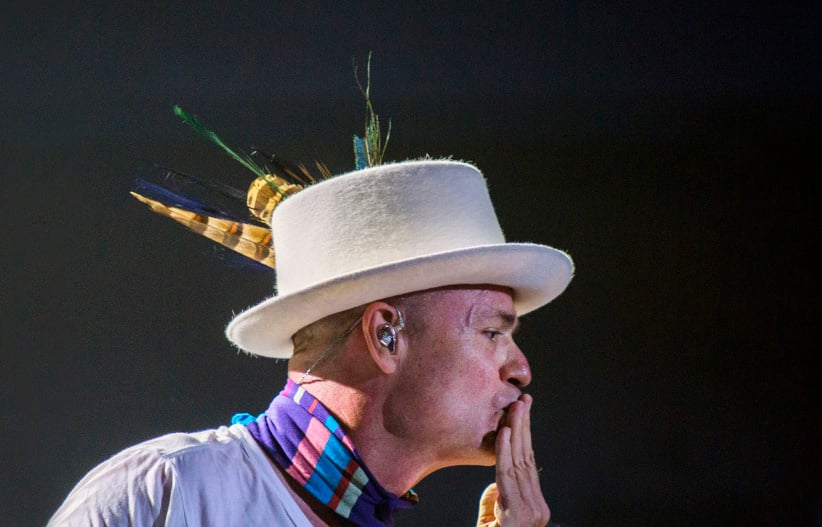
“They blocked off most of Main Street for your faith parade,” sings Downie on “Boots or Hearts.” They most certainly did: I hope the 25,000 people watching the show around the corner in Market Square got a charge out of that, as with the line: “I left myself on her answering machine / Said, ‘I’m back in town tonight.’ ” The hometown crowd inside K-Rock Centre, gathered for this most unusual and emotional occasion, grasped on to one line with particular gusto: “We’d probably only agree on one thing anyway / that’s: what the hell is happening here?”
“It’s going to take us 100 years to figure out what the hell went on up there,” Downie said on stage, regarding the First Nations issues he apparently discussed with Prime Minister Trudeau beforehand. “He cares about the people way up North, [who] we were trained our entire lives to ignore, to hear not a word of what’s going on up there. And what’s going on up there ain’t good. It’s maybe worse than it’s ever been. We’re going to get it fixed and we got the guy to do it, to start, to help.”
Again, it’s odd for the ever-elusive Downie, who once sang of a “bemused Trudeau” years before the son rose to power, to suddenly be playing political. But his next song, about a movie shot in his hometown, nods to the long-term thinking that’s increasingly in short supply everywhere in our culture, political, musical or otherwise: “Sometimes the faster it gets, the less you need to know / But you gotta remember: the smarter it gets, the further it’s going to go.” That was the Tragically Hip’s first hit single, 27 years ago. Downie hasn’t dumbed it down since.
“Blow at High Dough” could easily have closed the show: a high-energy rocker, a shout-out to the hometown, a circle back to the band’s beginnings. Instead, it is time to get dark: from Day for Night, a haunting “Nautical Disaster,” a devastating “Scared” (“I can make you scared / It’s kinda what I do”), and a triumphant and cathartic “Grace, Too,” which concludes with a literal mic-drop after some vein-popping howls from Downie.
But wait, there’s more: a third encore, with the rarely performed “Locked in a Trunk of a Car,” a song presumed to be about the FLQ kidnapping and murder of a Quebec cabinet minister during the 1970 October Crisis, a national drama that cast a dark shadow on Trudeaumania V.1. The song was released in 1993, when this country was still reeling from horror stories of schoolgirls raped, tortured and murdered. It features a singer who was likely recently inside an MRI machine, now heard howling, “Let me out!” Rock’n’roll can and should be dark and dangerous, and anyone who thinks Downie writes candy-coated Canadiana is dead wrong.
Penultimate pleasure “Gift Shop” is lovely, but ghostly, about looking down on the world from above. The last song is not one for the diehard fans, was not worthy of the wild speculation that preceded it. It was the Hip’s biggest radio hit, 1996’s “Ahead by a Century,” an acoustic-based pop song about childhood innocence, a song that is to a later generation of Canadians what Neil Young’s “Heart of Gold” was to Baby Boomers, a song that has had gymnasiums full of Canadian children united in song, a song with the lyric that has been quoted endlessly during this tour, in every review, on T-shirts, even inscribed on Gord Downie’s boots: “No dress rehearsal, this is our life.”
Canadians are a stoic bunch, imbued with optimism. Both inside and outside the venue there were tears, yes, but many held out hope that this was not the last time. People travelled from down the street and across the continent not necessarily because they even liked the Tragically Hip, but because they wanted to be there for a man who is likely losing a fight for his life. To show up, to be present. It was as if we’d all witnessed Terry Fox finally make it to the Pacific Ocean. Even if this was to be the last waltz, well, at least these men from Kingston showed the world what this town is made of. You know the word. Courage.
The scene in Kingston: